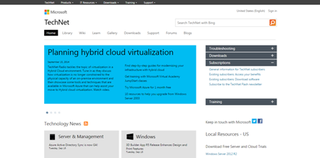Microsoft Developer Network (MSDN) was the division of Microsoft responsible for managing the firm's relationship with developers and testers, such as hardware developers interested in the operating system (OS), and software developers developing on the various OS platforms or using the API or scripting languages of Microsoft's applications. The relationship management was situated in assorted media: web sites, newsletters, developer conferences, trade media, blogs and DVD distribution.

An Internet forum, or message board, is an online discussion site where people can hold conversations in the form of posted messages. They differ from chat rooms in that messages are often longer than one line of text, and are at least temporarily archived. Also, depending on the access level of a user or the forum set-up, a posted message might need to be approved by a moderator before it becomes publicly visible.

Werner Koch is a German free software developer. He is best known as the principal author of the GNU Privacy Guard. He was also Head of Office and German Vice-Chancellor of the Free Software Foundation Europe. He is the winner of Award for the Advancement of Free Software in 2015 for founding GnuPG.

GameSpy was an American provider of online multiplayer and matchmaking middleware for video games founded in 1999 by Mark Surfas. After the release of a multiplayer server browser for Quake, QSpy, Surfas licensed the software under the GameSpy brand to other video game publishers through a newly established company, GameSpy Industries, which also incorporated his Planet Network of video game news and information websites, and GameSpy.com.

Ars Technica is a website covering news and opinions in technology, science, politics, and society, created by Ken Fisher and Jon Stokes in 1998. It publishes news, reviews, and guides on issues such as computer hardware and software, science, technology policy, and video games.
This article compares browser engines, especially actively-developed ones.
An anonymous post, is an entry on a textboard, anonymous bulletin board system, or other discussion forums like Internet forum, without a screen name or more commonly by using a non-identifiable pseudonym. Some online forums such as Slashdot do not allow such posts, requiring users to be registered either under their real name or utilizing a pseudonym. Others like JuicyCampus, AutoAdmit, 2channel, and other Futaba-based imageboards thrive on anonymity. Users of 4chan, in particular, interact in an anonymous and ephemeral environment that facilitates rapid generation of new trends.
Tianya Club is one of the most popular Internet forums in China. As of 2015, it is ranked by Alexa as the 11th most visited site in the People's Republic of China and 60th overall. It was founded on 14 February 1999.

Mumsnet is a London-based internet forum, created in 2000 by Justine Roberts for discussion between parents of children and teenagers.

Microsoft TechNet was a Microsoft web portal and web service for IT professionals. It included a library containing documentation and technical resources for Microsoft products, a learning center providing online training, discussion forums, an evaluation center for downloading trialware, blogs for Microsoft employees and a wiki.
HCL Connections is a Web 2.0 enterprise social software application developed originally by IBM and acquired by HCL Technologies in July 2019. Connections is an enterprise-collaboration platform which aims to helps teams work more efficiently. Connections is part of HCL collaboration suite which also includes Notes / Domino, Sametime, Portal and Connections.

Jacob Appelbaum is an American independent journalist, computer security researcher, artist, and hacker.

Pinwale is the code name for a National Security Agency (NSA) collection and retrieval system for so-called "Digital Network Intelligence", including internet e-mail. It is searchable by monitored NSA analysts.
Video game piracy is the unauthorized copying and distributing of video game software, and is a form of copyright infringement. It is often cited as a major problem that video game publishers face when distributing their products, due to the ease of being able to distribute games for free, via torrenting or websites offering direct download links. Right holders generally attempt to counter piracy of their products by enforcing the Digital Millennium Copyright Act, though this has never been totally successful. Digital distribution of pirated games has historically occurred on bulletin board systems (BBS), and more recently via decentralized peer-to-peer torrenting. In terms of physical distribution, Taiwan, China and Malaysia are known for major manufacturing and distribution centers for pirated game copies, while Hong Kong and Singapore are major importers.

XKeyscore is a secret computer system used by the United States National Security Agency (NSA) for searching and analyzing global Internet data, which it collects in real time. The NSA has shared XKeyscore with other intelligence agencies, including the Australian Signals Directorate, Canada's Communications Security Establishment, New Zealand's Government Communications Security Bureau, Britain's Government Communications Headquarters, Japan's Defense Intelligence Headquarters, and Germany's Bundesnachrichtendienst.

Bullrun is a clandestine, highly classified program to crack encryption of online communications and data, which is run by the United States National Security Agency (NSA). The British Government Communications Headquarters (GCHQ) has a similar program codenamed Edgehill. According to the Bullrun classification guide published by The Guardian, the program uses multiple methods including computer network exploitation, interdiction, industry relationships, collaboration with other intelligence community entities, and advanced mathematical techniques.

The ANT catalog is a classified product catalog by the U.S. National Security Agency (NSA) of which the version written in 2008–2009 was published by German news magazine Der Spiegel in December 2013. Forty-nine catalog pages with pictures, diagrams and descriptions of espionage devices and spying software were published. The items are available to the Tailored Access Operations unit and are mostly targeted at products from US companies such as Apple, Cisco and Dell. The source is believed to be someone different than Edward Snowden, who is largely responsible for the global surveillance disclosures since 2013. Companies whose products could be compromised have denied any collaboration with the NSA in developing these capabilities. In 2014, a project was started to implement the capabilities from the ANT catalog as open-source hardware and software.

8kun, previously called 8chan, Infinitechan or Infinitychan, is an imageboard website composed of user-created message boards. An owner moderates each board, with minimal interaction from site administration. The site has been linked to white supremacism, neo-Nazism, the alt-right, racism and antisemitism, hate crimes, and multiple mass shootings. The site has been known to host child pornography; as a result, it was filtered out from Google Search in 2015. Several of the site's boards played an active role in the Gamergate harassment campaign, encouraging Gamergate affiliates to frequent 8chan after 4chan banned the topic. 8chan is the origin and main center of activity of the discredited QAnon conspiracy theory.
The Shadow Brokers (TSB) is a hacker group who first appeared in the summer of 2016. They published several leaks containing hacking tools, including several zero-day exploits, from the "Equation Group" who are widely suspected to be a branch of the National Security Agency (NSA) of the United States. Specifically, these exploits and vulnerabilities targeted enterprise firewalls, antivirus software, and Microsoft products. The Shadow Brokers originally attributed the leaks to the Equation Group threat actor, who have been tied to the NSA's Tailored Access Operations unit.









